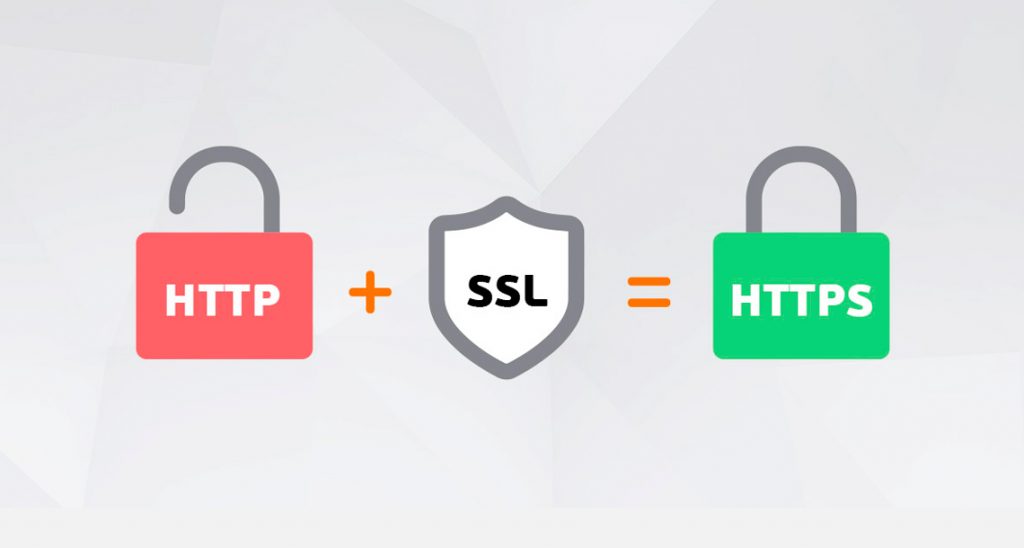У цій статті ми розповімо, як захистити дані клієнтів свого інтернет-магазину та які додаткові переваги дає підключення SSL-сертифіката.
Що таке “SSL сертифікат” ?
SSL розшифровується як Secure Sockets Layer – з англ. “рівень захищених сокетів”. Сертифікат – це посвідчувальний документ сайту, який підтверджує, що він є безпечним для інтернет-користувачів та їх зв’язку з певним вебсайтом. Зсередини – це набір файлів, які встановлені на сервер. Для інтернет-магазину він потрібен найбільше, адже покупці мають без побоювань вводити особисті дані та спокійно здійснювати покупки. Захищеність позначається за допомогою замочку в адресному рядку, а також літерами HTTPS. Протокол HTTPS – це технологія, яка дозволяє сайту і користувачам обмінюватися даними в зашифрованому вигляді. Так, браузер повідомляє відвідувача, що тут можна без побоювань вводити паролі, номери банківських карт і особисту інформацію. Усі вебсайти, створені нашою командою, мають SSL сертифікат. 
Сертифікати поділяються на види, в залежності від даних, які користувачі залишають на сайті:
На сьогодні існує понад 150 SSL. Якщо у вас в пріоритеті шифрувати дані, що передаються – підлаштовуйтеся під ваш домен і сайт.
- Якщо ваш сайт з одним доменом на латиниці, тоді підійде будь-який універсальний сертифікат.
- Якщо в домені вашого сайту є кириличні символи – потрібні сертифікати, які підтримують IDN. Це Comodo і GlobalSign.
- З великою кількістю піддоменів працюють сертифікати Wildcard. Він підходить для великих проектів.
- Якщо ви хочете додаткової інформації про ваш домен, – підкреслити його зеленим кольором, підтверджуючи статус компанії, обирайте – EV сертифікат.

Який би сертифікат ви не купили, після покупки доведеться пройти перевірку. Таким чином ви засвідчите свою особу і підтвердите права на домен сайту. Перевірка потрібна, щоб остаточно впевнитись, що ваш сайт не шахраї.
У такому випадку, сертифікати діляться на три види:
- «Само підписаний» сертифікат (Self-Signed SSL). Вони безкоштовні й видаються деякими хостингами. Тому їх легко зламати хакерам.
- DV – з перевіркою домену (Domain validation). Такий сертифікат засвідчує, що певний домен належить певній особі. Але оскільки при отриманні не потрібно пред’являти жодних документів, цей сертифікат вважається не надто надійним. Він підходить для блогів, новинних сайтів та інформаційних сторінок.
- OV — з перевіркою компанії (Organization validation). Цей документ можуть отримати виключно юридичні особи. Такий інтернет-магазину має бути юридично зареєстрованим, щоб отримати сертифікат. Власник має надати копії документів та інформацію про адресу, телефон компанії. Натиснувши на замочок, користувачі зможуть побачити інформацію про компанію та переконатися, що вона реально існує. Це надійний і не занадто дорогий варіант для інтернет-магазинів.
- EV — з розширеною перевіркою компанії (Extended validation). Центр сертифікації перевіряє реєстраційні документи, податкову та комерційну діяльність компанії. Це максимальний рівень захисту. В адресному рядку користувачі зможуть побачити рядок з назвою компанії. Цей сертифікат необхідний великим організаціям на кшталт маркетплейсів або банків. Він не завадить і меншим компаніям, але їх найчастіше зупиняє висока ціна.
Де придбати SSL-сертифікат?
Ми у свою чергу рекомендуємо один з найпопулярніших та безкоштовних SSL-центрів – Letsencrypt.org. 
Чому варто отримати SSL сертифікат?
- Кожна компанія, яка просить контактні дані для реєстрації на сайті, стає оператором персональних даних користувачів і зобов’язується забезпечити їхній захист.
- Наявність замочка та напис «Безпечне підключення» – безумовно підвищує довіру до сайту. Якщо ви зберігаєте персональні дані, продаєте товари або надаєте платний сервіс, наявність сертифіката обов’язкова. Сервіси онлайн-оплат відмовляють у своїх послугах сайтам без SSL-сертифіката.
- Використання протоколу захищеного з’єднання — це один з факторів ранжування Google, про що ми розповідали у своєму блозі раніше.
- Коли ви не маєте сертифікату, браузер буде показувати користувачам повідомлення, що на сайті незахищене з’єднання. Це може значно знизити конверсію, адже мало хто захоче заходити на сайт з червоним попередженням від браузера.

Як наявність сертифікату впливає на SEO вашого сайту?
Рекомендація спеціаліста Google:
«Ви завжди повинні захищати свій сайт за допомогою HTTPS, навіть не використовуючи конфіденційну інформацію. Це не тільки забезпечує збереження даних на сайтах та особисту інформацію користувачів, але і потрібно для роботи багатьох нових функцій браузера, особливо для прогресивних вебдодатків»
SSL-сертифікат має долю впливу на SEO. Розробники Google спеціально зробили HTTPS-з’єднання фактором ранжування, щоб спонукати людей захищати свої сайти. Ще з 2017 року Google стали позначати сайти, які не працюють за HTTPS-протоколом як ненадійні. В Google Chrome з’являється відмітка для сайтів без SSL-сертифіката. Перехід на HTTPS – це завжди ціла історія, особливо для великих сайтів. Якщо зробити це неправильно, можна втратити трафік. Щоб допомогти власникам сайтів не втратити трафік, Google склали рекомендації по переходу на HTTPS. Перед тим як встановлювати сертифікат, можна з ними ознайомитися. Пошукові системи дуже цінують, коли сайти працюють по HTTPS з’єднання. Ігнорування сертифіката безпеки може вдарити не тільки по репутації сайту, але і по SEO-позиціях в пошукових системах: алгоритми Google, наприклад, просувають у видачі саме захищені ресурси. Але недостатньо просто встановити SSL-сертифікат і чекати, коли сайт почне підійматися в пошуковій видачі. В першу чергу сертифікат потрібен, щоб зробити сайт безпечним. Ви маєте дбати про захищеність інформації користувачів вашого сайту, а додатковий фактор ранжування буде приємним бонусом. 




